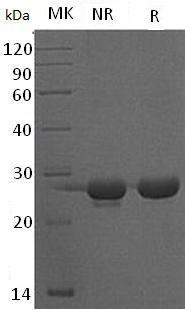-
Product Name
Mouse Fgf9/Fgf-9 (His tag) recombinant protein
- Documents
-
Description
Fibroblast growth factor-9 (FGF-9) is an approximately 26 kDa secreted glycoprotein of the FGF family. Secreted mouse FGF-9 lacks the N-terminal 1-3 aa and shares >98% sequence identity with rat, human, equine, porcine and bovine FGF-9. FGF-9 plays an important role in the regulation of embryonic development, cell proliferation, cell differentiation and cell migration. In the mouse embryo the location and timing of FGF-9 expression affects development of the skeleton, cerebellum, lungs, heart, vasculature, digestive tract, and testes .It may have a role in glial cell growth and differentiation during development, gliosis during repair and regeneration of brain tissue after damage, differentiation and survival of neuronal cells, and growth stimulation of glial tumors. Deletion of mouse FGF-9 is lethal at birth due to lung hypoplasia, and causes rhizomelia, or shortening of the proximal skeleton. An unusual constitutive dimerization of FGF 9 buries receptor interaction sites which lowers its activity, and increases heparin affinity which inhibits diffusion. A spontaneous mouse mutant, Eks, interferes with dimerization, resulting monomeric, diffusible FGF-9 that causes elbow and knee synostoses (joint fusions) due to FGF-9 misexpression in developing joints.
-
Protein name
fibroblast growth factor 9(Fgf9)
-
Protein short names
Fgf-9
-
Uniprot ID
P54130
-
Source/Expression Host
E. coli
-
Expression Plasmid/cDNA
A DNA sequence encoding the Mouse Fgf9/Fgf-9 Met1Ser208 is expressed with a 6his tag at the C-terminus.
-
Protein Species
Mouse
-
Purity
>95% as determined by SDS-PAGE.
-
Validations

Mouse Fgf9/Fgf-9 (His tag) recombinant protein
Related Products / Services
Please note: All products are "FOR RESEARCH USE ONLY AND ARE NOT INTENDED FOR DIAGNOSTIC OR THERAPEUTIC USE"
